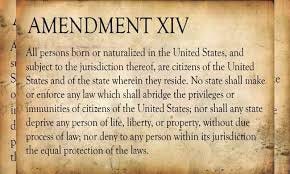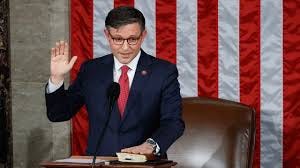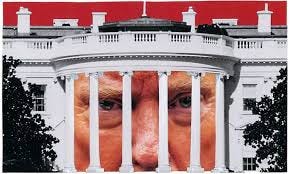Congressional Power: The Battle to Block Trump's Presidency
Introduction
In a recent conversation between Nicolás Morás and Nicolás Lage, the two commentators tackled one of the most contentious and volatile topics in contemporary U.S. politics: the mounting challenges surrounding Donald Trump’s potential return to power. Through an in-depth analysis of media narratives, Republican Party infighting, and constitutional dilemmas, the duo explored the precarious state of American democracy and the forces driving its instability.
With discussions ranging from the interpretation of the 14th Amendment to the power struggles within MAGA, traditional Republicans, and technocratic elites, the conversation illuminated the complexities of the current political climate. As they delved into the implications of Congressional gridlock and potential scenarios of constitutional crises, Morás and Lage painted a vivid picture of a nation on the brink of historic transformation. Their dialogue offers a comprehensive lens through which to examine the stakes and uncertainties shaping the United States today.
Congressional Power and Trump’s Presidential Hurdles
The conversation begins with the presenters discussing the controversial notion of whether Donald Trump could be prevented from assuming the presidency if he wins the 2024 election. The dialogue points out that while Trump has strong support among certain elites, other factions are resistant to his return to power. Nicolás Morás remarks, "Some of those who do not want Trump are not going to be so willing to hand over power to him again." This sets the stage for a deeper discussion about the legal and procedural mechanisms being considered.
https://thehill.com/opinion/congress-blog/5055171-constitution-insurrection-trump-disqualification/
One of the primary topics was an opinion column from The Hill, which argued that the U.S. Congress holds the power to block Trump’s presidency. Referencing the 14th Amendment, Section 3, the presenters explained its implications: "No person shall hold any civil or military office in the United States...who, having previously taken an oath to support the Constitution, has engaged in insurrection or rebellion," was quoted as the constitutional basis for this argument. They noted that this clause has rarely been invoked but is now being scrutinized by both Congress and judicial institutions.
Challenges within Congress and Technological Influence
The presenters highlighted escalating tensions between factions within Congress, particularly surrounding Mike Johnson, Trump’s ally and Speaker of the House. Elon Musk’s influence was a recurring theme, with his opposition to a bipartisan budget proposal brought forward by Johnson causing significant disruption. According to Nicolás Morás, Musk’s social media platform, X (formerly Twitter), became a battleground where he extensively criticized the project. Morás noted, "More than 100 posts from Elon Musk criticizing the project...resulted in the project being withdrawn." This confrontation underscored the unpredictable dynamics between technocrats like Musk and traditional political players.
Nicolás also explored how this conflict might affect Johnson’s future as Speaker of the House. Democrats and even some Republicans have expressed doubts about supporting his re-election to the leadership role. The potential consequences of these internal divisions include leaving the House leaderless and disrupting the certification process for the Electoral College, potentially leading to an unprecedented constitutional crisis.
Speculative Scenarios and Broader Implications
The presenters speculated on extreme scenarios if the presidency remains uncertified by January 20, 2025. This would leave the U.S. without a clear executive leader, pushing succession to the President of the Senate or potentially a senior senator like Chuck Grassley. They referred to this situation as a "zona gris, (grey zone)" likening it to the chaos of Argentina’s 2001 political crisis. Nicolás Lage humorously remarked, "Really, we’ll have to see if they dare do something like that...Argentina 2001, really."
Media Narratives and Public Perception
The discussion also touched on how media narratives are shaping public perception of the situation, with a specific focus on opinion pieces from The Daily Beast and The Hill. While The Daily Beast was characterized as overtly progressive and aligned with Democratic interests, The Hill was presented as a more centrist outlet, making its critical take on Trump’s eligibility all the more noteworthy. Morás cited the authors of The Hill piece, Ivan Davis and David Schulte, who argued for Congressional intervention: "The House of Representatives must act now."
This narrative, according to the presenters, aims to normalize the idea of Congressional action against Trump by framing it as a constitutional duty. The column was described as a testing ground to gauge public support for such a controversial move. Morás reflected on the media’s role, saying, “They are calling on members of the House to defend the Constitution... to put on their pants and do it.” This underscores the presenters’ view of the media’s influence in swaying public opinion and justifying political actions.
Conflict Between Political Factions
Internal conflicts within the Republican Party were also a key focus. Tensions between the traditional Republican establishment, MAGA supporters, and emerging technocratic factions such as those aligned with Elon Musk were described as reaching a boiling point. This division has been exacerbated by high-profile incidents, such as Musk’s criticism of the budget proposal and public spats between prominent figures like Vivek Ramaswamy and conservative influencers. Morás elaborated, “Musk called many MAGA supporters idiots.”
The presenters also mentioned conservative activist Laura Loomer, who complained about losing her verification on X, further fueling the divide between technocratic forces and MAGA loyalists. This situation, according to Morás, highlights deeper ideological and strategic differences within the Republican Party that could complicate Trump’s potential return to power.
Constitutional Crisis and Future Uncertainty
Finally, the script delved into the potential for a constitutional crisis if Congress remains deadlocked and unable to certify the Electoral College results by January 20. The presenters outlined a grim scenario in which Joe Biden’s term would end without a clear successor, leaving the presidency temporarily vacant. Nicolás Lage speculated, “If the elections are not certified before January 20... the Speaker of the House would be next.” However, if no Speaker is elected by then, the chain of succession could extend to senior senators, such as Chuck Grassley, who recently turned 91.
This unprecedented scenario was described as plunging the country into chaos, with the presenters likening it to the plot of a dystopian film. “A gray zone for political power... it would be taking a risk and putting the country in a total crisis situation,” Morás emphasized. They concluded by pondering the political and social implications of such a scenario, noting that it would be a historic and unpredictable turning point.
Conclusion
The detailed discussion presented by Nicolás Morás and Nicolás Lage sheds light on the profound political and constitutional tensions looming over the United States. From Trump’s eligibility under the 14th Amendment to the infighting within the Republican Party and the rising influence of technocratic forces like Elon Musk, the presenters highlight the complexities and stakes of this unprecedented moment. As they argue, the potential for a constitutional crisis—fueled by media narratives, partisan division, and legal ambiguities—could push the nation into uncharted territory.
The speculation about succession scenarios, Congressional deadlock, and the inability to certify Electoral College results underscores the fragile state of U.S. governance. The presenters’ observation that “Qué tiempo para estar vivo,” reflects both the uncertainty and historical weight of these events. As the political landscape continues to shift, their analysis serves as a stark reminder of the challenges facing democratic institutions and the unpredictable path ahead.
Thank You for Your Support
We want to take a moment to thank you for dedicating your time to explore these critical issues with us. Your engagement and curiosity are what drive us to continue delivering in-depth, transparent, and thought-provoking content. If you found this article insightful, we encourage you to share it with friends, family, and anyone who values staying informed about the pressing issues shaping our world.
Your support makes all the difference. By liking, subscribing, and sharing our work, you help amplify these discussions and ensure that more people have access to crucial information. Additionally, if you’re able, consider making a donation to support our efforts. It’s through your generosity that we can continue researching, analyzing, and delivering the best information possible. Together, we can ensure that these important conversations reach as many people as possible.









